Related Research Articles

Maurice Ernest Gibb was a British musician and songwriter. He achieved worldwide fame as a member of the pop group Bee Gees. Although his elder brother Barry Gibb and twin brother Robin Gibb were the group's main lead singers, most of their albums included at least one or two songs featuring Maurice's lead vocals, including "Lay It on Me", "Country Woman" and "On Time". The Bee Gees are one of the most successful pop-rock groups of all time.

Sir Barry Alan Crompton Gibb is a British musician, singer, songwriter and record producer. Along with his younger twin brothers, Robin and Maurice, he rose to worldwide fame as a member of the Bee Gees, one of the most commercially successful groups in the history of popular music. Gibb is well known for his wide vocal range including a far-reaching high-pitched falsetto. Gibb's career has spanned over 60 years.
Andrew Roy Gibb was an English-Australian singer and songwriter. He was the younger brother of Barry, Robin, and Maurice Gibb, musicians who had formed the Bee Gees during the mid-1960s. Gibb came to prominence in the late-1970s through the early-1980s with eight singles reaching the Top 20 of the US Hot 100, three of which went to No. 1: "I Just Want to Be Your Everything" (1977), "(Love Is) Thicker Than Water" (1977), and "Shadow Dancing" (1978). In the early 1980s, he co-hosted the American music television series Solid Gold. He also performed in a production of The Pirates of Penzance and Joseph and the Amazing Technicolor Dreamcoat. Gibb would later struggle with drug addiction and depression. He died on 10 March 1988, five days after his 30th birthday.

This Is Where I Came In is the twenty-second and final studio album by the Bee Gees. It was released on 2 April 2001 by Polydor in the UK and Universal in the US, less than two years before Maurice Gibb died from a cardiac arrest before surgery to repair a twisted intestine.

Best of Bee Gees is a 1969 compilation album by the English-Australian rock band Bee Gees. It was their first international greatest hits album. It featured their singles from 1966–1969 with the exception of the band's 1968 single "Jumbo".
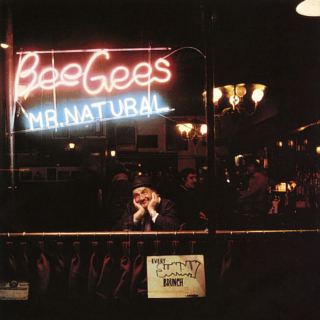
Mr. Natural is the twelfth studio album by the Bee Gees, released in 1974. It was the first Bee Gees release produced by Arif Mardin, who was partially responsible for launching the group's later major success with the follow-up album Main Course. The album's rhythm and blues, soul, funk, and hard rock sounds initiated the group's reinvention as a disco and blue-eyed soul act, which would solidify on subsequent albums. However, Barry Gibb has said that the album was "whiter" than Main Course. The cover photograph was taken at 334 West 4th Street, Greenwich Village, New York City by Frank Moscati, which is today known as The Corner Bistro tavern.

Size Isn't Everything is the twentieth studio album by the Bee Gees, released in the UK on 13 September 1993, and the US on 2 November of the same year. The brothers abandoned the contemporary dance feel of the previous album High Civilization and went for what they would describe as "A return to our sound before Saturday Night Fever".

The Bee Gees Sing and Play 14 Barry Gibb Songs is the debut studio album by the Bee Gees. Credited to Barry Gibb and the Bee Gees, it was released in November 1965 on the Australian Leedon label. It is largely a compilation of most of the Gibb brothers' singles that had been released over the previous three years in Australia, which accounts for the many different styles of music on it.
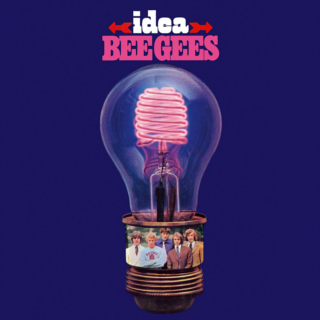
Idea is the fifth album by the Bee Gees. Released in August 1968, the album sold over a million copies worldwide. The album was issued in both mono and stereo pressings in the UK. The artwork on the Polydor release designed by Wolfgang Heilemann featured a "beehive" neon lightbulb with a group photo in its base, while the North American ATCO release designed by Klaus Voormann featured a composite head made from each band member. It was their third internationally released album – the first two albums being released only in the Australian market.

Living Eyes is the sixteenth studio album by the Bee Gees, released in 1981. It was the band's final album on RSO Records, which would be absorbed into Polydor and subsequently discontinued. The album showcased a soft rock sound that contrasted with their disco and R&B material of the mid-to-late 1970s; having become a prominent target of the popular backlash against disco, the Bee Gees were pressured to publicly disassociate from the genre.
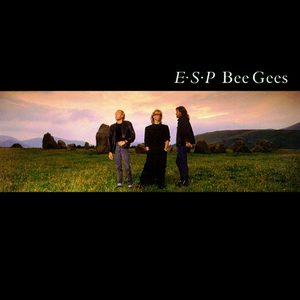
E.S.P. is the seventeenth studio album by the Bee Gees released in 1987. It was the band's first studio album in six years, and their first release under their new contract with Warner Bros. It marked the first time in twelve years the band had worked with producer Arif Mardin, and was their first album to be recorded digitally. After the band's popularity had waned following the infamous Disco Demolition Night of 1979, the Gibb brothers had spent much of the early 1980s writing and producing songs for other artists, as well as pursuing solo projects, and E.S.P. was very much a comeback to prominence. The album sold well in Europe, reaching No. 5 in the UK, No. 2 in Norway and Austria, and No. 1 in Germany and Switzerland, though it failed to chart higher than No. 96 in the US. The album's first single, "You Win Again", reached No. 1 in the UK, Ireland, Switzerland, Germany, Austria and Norway.
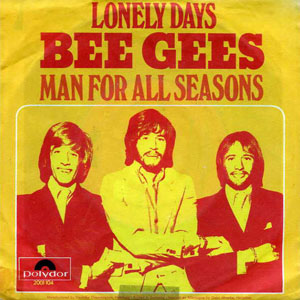
"Lonely Days" is a ballad written and performed by the Bee Gees. It appeared on their album 2 Years On, and was released as a single, becoming their first Top Five hit in the US, peaking at number three in the Billboard Hot 100 and reaching number one in the Cashbox and Record World charts. Barry Gibb later re-recorded the song with country quartet Little Big Town for his 2021 album Greenfields.
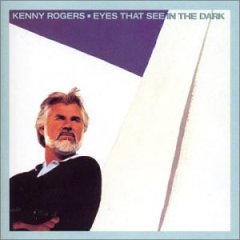
Eyes That See in the Dark is the fifteenth studio album by American country singer Kenny Rogers, released by RCA Records in August 1983.
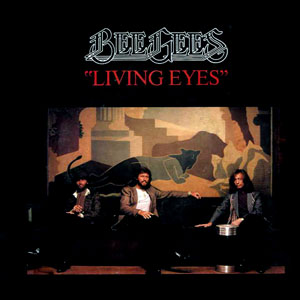
"Living Eyes" is a power ballad recorded by the Bee Gees and was released in November 1981 as the second single and title track off the LP of the same name. It was written by Barry, Robin & Maurice Gibb. The sound of this single was closer musically to the rest of the album than its predecessor, "He's a Liar".

"Ordinary Lives" is a song by the Bee Gees from their 16th studio album One, released on 27 March 1989 by Warner Records as the album's first single. It was written by the group and they produced it with Brian Tench. Following the premature death of their younger brother Andy Gibb in 1988, the Bee Gees dedicated this song and their new album to him. Originally the song was titled "Cruel World" but was later changed to "Ordinary Lives". The song reached the top 10 in Switzerland and Germany, and hitting the top 40 in some European countries except France and the UK, where it peaked at number 49 and 54 respectively.
"Melody Fair" is a song by the Bee Gees, written by Barry, Robin & Maurice Gibb in 1968 and released in 1969 on their album Odessa. It was not released as a single, but this song was played on many radio stations, and was a hit in Japan. Andy Gibb's 1974 group, named Melody Fayre was named after this song. It also featured as the theme to Melody, a British film featuring a number of Bee Gees songs in its soundtrack.

After Dark is the third and final studio album by English singer-songwriter Andy Gibb. It features his last US Top 10 single "Desire", "I Can't Help It" and two Bee Gees numbers "Rest Your Love on Me" and "Warm Ride".

Mythology is a box set compilation of recordings by the Gibb brothers, mostly performed as the Bee Gees, arranged in a four disc set each highlighting a Gibb brother. Barry and Robin chose their own songs, with Maurice's songs selected by his widow Yvonne and Andy's songs selected by his daughter Peta. Several U.S. and U.K. hits are absent from this collection including "Lonely Days", "How Can You Mend a Broken Heart", "You Should Be Dancing", "Nights on Broadway", "World" and "One".

"Lamplight" is a song by the Bee Gees, released as the B-side of "First of May", but featured as the single's A-side in Germany. It also featured on their double album Odessa in March 1969. The song was written and composed by Barry, Robin & Maurice Gibb and featured lead vocals by Robin Gibb. No other singles were released from the album, and the fact that the group's manager Robert Stigwood chose "First of May", which only featured Barry Gibb's voice for the A-side, that caused Robin to quit the group.
"Where Are You" is a song by the Bee Gees, written by Maurice Gibb. It marked his debut as a lead vocalist and solo composer. It was included on the 1966 album Spicks and Specks. In 1968, it was released in the US.
References
- Brennan, Joseph (2010). "Andy Gibb". Gibb Songs: 1987. Retrieved 9 February 2011.
- VH1, Behind The Music: Andy Gibb, 1994, Viacom International.